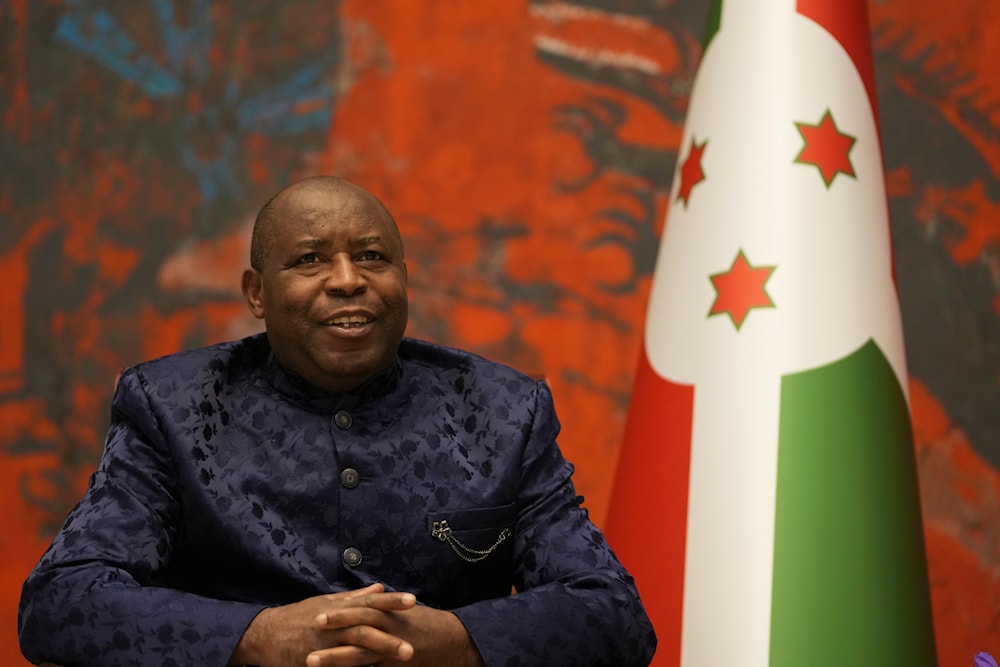Burundi accuses Rwanda of plotting an attack, while Rwanda urges calm
In recent weeks, Burundian and Rwandan officials have reached an understanding that neither the Rwandan military nor M23 would occupy the Congolese town of Uvira, near Burundi’s commercial capital.
-
 Burundi President Evariste Ndayishimiye speaks with his Serbian counterpart Aleksandar Vucic at the Serbia Palace in Belgrade, Serbia, Wednesday, March 12, 2025 (AP)
Burundi President Evariste Ndayishimiye speaks with his Serbian counterpart Aleksandar Vucic at the Serbia Palace in Belgrade, Serbia, Wednesday, March 12, 2025 (AP)
Burundi's President warned that Rwanda has plans to attack his country, after Burundian forces aided the Democratic Republic of Congo (DRC) in its fight against the Rwandan-backed M23 rebels.
President Evariste Ndayishimiye stated that he had received "credible intelligence" indicating Rwanda's plans to attack Burundi, though he did not provide further details on the alleged plan, which Rwanda denied.
"We know that he has a plan to attack Burundi," Ndayishimiye said in an interview with the BBC, referring to Rwandan President Paul Kagame, stressing that "Burundians will not accept to be killed as Congolese are being killed. Burundian people are fighters."
Rwanda's Foreign Minister, Olivier Nduhungirehe, called the statement "unfortunate" and added in a post on X that the two countries were engaged in discussions, having agreed on the necessity for both military and verbal de-escalation.
This comes amid intensified tensions between the DRC and M23 rebels, as the Rwandan-backed rebels continue to seize land despite the two countries working toward a ceasefire.
A war in eastern DRC between 1998 and 2003 involved more than half a dozen foreign armies. Currently, Rwanda has deployed troops and supplied weapons to support the M23 rebel group, according to the United Nations, while Burundian forces have been fighting alongside the Congolese military.
Rwanda denies backing M23, asserting that its forces are acting in self-defense against the Congolese army and militias hostile to Kigali.
Burundi has maintained a military presence in Congo for years to combat Burundian rebels. However, in February, it withdrew most of its 12,000 troops, according to a Burundian military officer and diplomatic sources cited by Reuters.
In recent weeks, Burundian and Rwandan officials have held multiple meetings and reached an understanding that neither the Rwandan military nor M23 would occupy the Congolese town of Uvira, near Burundi’s commercial capital, Bujumbura, according to four sources familiar with the discussions.
Both countries have acknowledged the meetings but have not disclosed further details.
Ceasefire talks falter
On March 18, Congolese President Felix Tshisekedi and his Rwandan counterpart Paul Kagame met in Qatar for their first direct talks since M23 intensified its offensive in January.
Alongside Qatari officials, they issued a joint statement calling for an “immediate and unconditional” ceasefire. However, the rebel group’s continued westward push raises doubts over the viability of the truce.
Later, the M23 rebel movement announced its withdrawal from planned negotiations with the DRC government, citing international sanctions as a key obstacle to dialogue.
Despite initially sending a delegation, M23 released a statement through its spokesperson, Lawrence Kanyuka, expressing frustration over what it described as external interference. The group accused certain international bodies of deliberately hindering peace efforts and making negotiations unfeasible.
"Successive sanctions imposed on our members … severely undermine direct dialogue and make any progress impossible … Under these circumstances, the talks have become impracticable. Consequently, our organization can no longer continue to participate in the discussions," the statement read.

 3 Min Read
3 Min Read








